#right to repair
Text
"The California state government has passed a landmark law that obligates technology companies to provide parts and manuals for repairing smartphones for seven years after their market release.
Senate Bill 244 passed 65-0 in the Assembly, and 38-0 in the Senate, and made California, the seat of so much of American technological hardware and software, the third state in the union to pass this so-called “right to repair” legislation.
On a more granular level, the bill guarantees consumers’ rights to replacement parts for three years’ time in the case of devices costing between $50 and $99, and seven years in the case of devices costing more than $100, with the bill retroactively affecting devices made and sold in 2021.
Similar laws have been passed in Minnesota and New York, but none with such a long-term period as California.
“Accessible, affordable, widely available repair benefits everyone,” said Kyle Wiens, the CEO of advocacy group iFixit, in a statement. “We’re especially thrilled to see this bill pass in the state where iFixit is headquartered, which also happens to be Big Tech’s backyard. Since Right to Repair can pass here, expect it to be on its way to a backyard near you.” ...
One of the reasons Wiens is cheering this on is because large manufacturers, from John Deere to Apple, have previously lobbied heavily against right-to-repair legislation for two reasons. One, it allows them to corner the repair and maintenance markets, and two, it [allegedly] protects their intellectual property and trade secrets from knock-offs or competition.
However, a byproduct of the difficulty of repairing modern electronics is that most people just throw them away.
...Wien added in the statement that he believes the California bill is a watershed that will cause a landslide of this legislation to come in the near future."
-via Good News Network, October 16, 2023
#united states#us politics#right to repair#planned obsolescence#enshittification#big tech#iphone#sustainability#ewaste#consumer rights#electronics#good news#hope#california#silicon valley
9K notes
·
View notes
Text
Tesla's Dieselgate
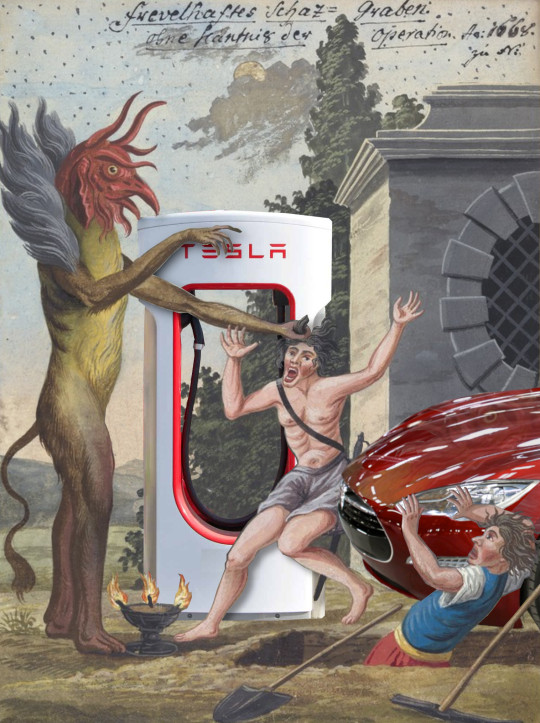
Elon Musk lies a lot. He lies about being a “utopian socialist.” He lies about being a “free speech absolutist.” He lies about which companies he founded:
https://www.businessinsider.com/tesla-cofounder-martin-eberhard-interview-history-elon-musk-ev-market-2023-2
He lies about being the “chief engineer” of those companies:
https://www.quora.com/Was-Elon-Musk-the-actual-engineer-behind-SpaceX-and-Tesla
He lies about really stupid stuff, like claiming that comsats that share the same spectrum will deliver steady broadband speeds as they add more users who each get a narrower slice of that spectrum:
https://www.eff.org/wp/case-fiber-home-today-why-fiber-superior-medium-21st-century-broadband
The fundamental laws of physics don’t care about this bullshit, but people do. The comsat lie convinced a bunch of people that pulling fiber to all our homes is literally impossible — as though the electrical and phone lines that come to our homes now were installed by an ancient, lost civilization. Pulling new cabling isn’t a mysterious art, like embalming pharaohs. We do it all the time. One of the poorest places in America installed universal fiber with a mule named “Ole Bub”:
https://www.newyorker.com/tech/annals-of-technology/the-one-traffic-light-town-with-some-of-the-fastest-internet-in-the-us
Previous tech barons had “reality distortion fields,” but Musk just blithely contradicts himself and pretends he isn’t doing so, like a budget Steve Jobs. There’s an entire site devoted to cataloging Musk’s public lies:
https://elonmusk.today/
But while Musk lacks the charm of earlier Silicon Valley grifters, he’s much better than they ever were at running a long con. For years, he’s been promising “full self driving…next year.”
https://pluralistic.net/2022/10/09/herbies-revenge/#100-billion-here-100-billion-there-pretty-soon-youre-talking-real-money
He’s hasn’t delivered, but he keeps claiming he has, making Teslas some of the deadliest cars on the road:
https://www.washingtonpost.com/technology/2023/06/10/tesla-autopilot-crashes-elon-musk/
Tesla is a giant shell-game masquerading as a car company. The important thing about Tesla isn’t its cars, it’s Tesla’s business arrangement, the Tesla-Financial Complex:
https://pluralistic.net/2021/11/24/no-puedo-pagar-no-pagara/#Rat
Once you start unpacking Tesla’s balance sheets, you start to realize how much the company depends on government subsidies and tax-breaks, combined with selling carbon credits that make huge, planet-destroying SUVs possible, under the pretense that this is somehow good for the environment:
https://pluralistic.net/2021/04/14/for-sale-green-indulgences/#killer-analogy
But even with all those financial shenanigans, Tesla’s got an absurdly high valuation, soaring at times to 1600x its profitability:
https://pluralistic.net/2021/01/15/hoover-calling/#intangibles
That valuation represents a bet on Tesla’s ability to extract ever-higher rents from its customers. Take Tesla’s batteries: you pay for the battery when you buy your car, but you don’t own that battery. You have to rent the right to use its full capacity, with Tesla reserving the right to reduce how far you go on a charge based on your willingness to pay:
https://memex.craphound.com/2017/09/10/teslas-demon-haunted-cars-in-irmas-path-get-a-temporary-battery-life-boost/
That’s just one of the many rent-a-features that Tesla drivers have to shell out for. You don’t own your car at all: when you sell it as a used vehicle, Tesla strips out these features you paid for and makes the next driver pay again, reducing the value of your used car and transfering it to Tesla’s shareholders:
https://www.theverge.com/2020/2/6/21127243/tesla-model-s-autopilot-disabled-remotely-used-car-update
To maintain this rent-extraction racket, Tesla uses DRM that makes it a felony to alter your own car’s software without Tesla’s permission. This is the root of all autoenshittification:
https://pluralistic.net/2023/07/24/rent-to-pwn/#kitt-is-a-demon
This is technofeudalism. Whereas capitalists seek profits (income from selling things), feudalists seek rents (income from owning the things other people use). If Telsa were a capitalist enterprise, then entrepreneurs could enter the market and sell mods that let you unlock the functionality in your own car:
https://pluralistic.net/2020/06/11/1-in-3/#boost-50
But because Tesla is a feudal enterprise, capitalists must first secure permission from the fief, Elon Musk, who decides which companies are allowed to compete with him, and how.
Once a company owns the right to decide which software you can run, there’s no limit to the ways it can extract rent from you. Blocking you from changing your device’s software lets a company run overt scams on you. For example, they can block you from getting your car independently repaired with third-party parts.
But they can also screw you in sneaky ways. Once a device has DRM on it, Section 1201 of the DMCA makes it a felony to bypass that DRM, even for legitimate purposes. That means that your DRM-locked device can spy on you, and because no one is allowed to explore how that surveillance works, the manufacturer can be incredibly sloppy with all the personal info they gather:
https://www.cnbc.com/2019/03/29/tesla-model-3-keeps-data-like-crash-videos-location-phone-contacts.html
All kinds of hidden anti-features can lurk in your DRM-locked car, protected from discovery, analysis and criticism by the illegality of bypassing the DRM. For example, Teslas have a hidden feature that lets them lock out their owners and summon a repo man to drive them away if you have a dispute about a late payment:
https://tiremeetsroad.com/2021/03/18/tesla-allegedly-remotely-unlocks-model-3-owners-car-uses-smart-summon-to-help-repo-agent/
DRM is a gun on the mantlepiece in Act I, and by Act III, it goes off, revealing some kind of ugly and often dangerous scam. Remember Dieselgate? Volkswagen created a line of demon-haunted cars: if they thought they were being scrutinized (by regulators measuring their emissions), they switched into a mode that traded performance for low emissions. But when they believed themselves to be unobserved, they reversed this, emitting deadly levels of NOX but delivering superior mileage.
The conversion of the VW diesel fleet into mobile gas-chambers wouldn’t have been possible without DRM. DRM adds a layer of serious criminal jeopardy to anyone attempting to reverse-engineer and study any device, from a phone to a car. DRM let Apple claim to be a champion of its users’ privacy even as it spied on them from asshole to appetite:
https://pluralistic.net/2022/11/14/luxury-surveillance/#liar-liar
Now, Tesla is having its own Dieselgate scandal. A stunning investigation by Steve Stecklow and Norihiko Shirouzu for Reuters reveals how Tesla was able to create its own demon-haunted car, which systematically deceived drivers about its driving range, and the increasingly desperate measures the company turned to as customers discovered the ruse:
https://www.reuters.com/investigates/special-report/tesla-batteries-range/
The root of the deception is very simple: Tesla mis-sells its cars by falsely claiming ranges that those cars can’t attain. Every person who ever bought a Tesla was defrauded.
But this fraud would be easy to detect. If you bought a Tesla rated for 353 miles on a charge, but the dashboard range predictor told you that your fully charged car could only go 150 miles, you’d immediately figure something was up. So your Telsa tells another lie: the range predictor tells you that you can go 353 miles.
But again, if the car continued to tell you it has 203 miles of range when it was about to run out of charge, you’d figure something was up pretty quick — like, the first time your car ran out of battery while the dashboard cheerily informed you that you had 203 miles of range left.
So Teslas tell a third lie: when the battery charge reached about 50%, the fake range is replaced with the real one. That way, drivers aren’t getting mass-stranded by the roadside, and the scam can continue.
But there’s a new problem: drivers whose cars are rated for 353 miles but can’t go anything like that far on a full charge naturally assume that something is wrong with their cars, so they start calling Tesla service and asking to have the car checked over.
This creates a problem for Tesla: those service calls can cost the company $1,000, and of course, there’s nothing wrong with the car. It’s performing exactly as designed. So Tesla created its boldest fraud yet: a boiler-room full of anti-salespeople charged with convincing people that their cars weren’t broken.
This new unit — the “diversion team” — was headquartered in a Nevada satellite office, which was equipped with a metal xylophone that would be rung in triumph every time a Tesla owner was successfully conned into thinking that their car wasn’t defrauding them.
When a Tesla owner called this boiler room, the diverter would run remote diagnostics on their car, then pronounce it fine, and chide the driver for having energy-hungry driving habits (shades of Steve Jobs’s “You’re holding it wrong”):
https://www.wired.com/2010/06/iphone-4-holding-it-wrong/
The drivers who called the Diversion Team weren’t just lied to, they were also punished. The Tesla app was silently altered so that anyone who filed a complaint about their car’s range was no longer able to book a service appointment for any reason. If their car malfunctioned, they’d have to request a callback, which could take several days.
Meanwhile, the diverters on the diversion team were instructed not to inform drivers if the remote diagnostics they performed detected any other defects in the cars.
The diversion team had a 750 complaint/week quota: to juke this stat, diverters would close the case for any driver who failed to answer the phone when they were eventually called back. The center received 2,000+ calls every week. Diverters were ordered to keep calls to five minutes or less.
Eventually, diverters were ordered to cease performing any remote diagnostics on drivers’ cars: a source told Reuters that “Thousands of customers were told there is nothing wrong with their car” without any diagnostics being performed.
Predicting EV range is an inexact science as many factors can affect battery life, notably whether a journey is uphill or downhill. Every EV automaker has to come up with a figure that represents some kind of best guess under a mix of conditions. But while other manufacturers err on the side of caution, Tesla has the most inaccurate mileage estimates in the industry, double the industry average.
Other countries’ regulators have taken note. In Korea, Tesla was fined millions and Elon Musk was personally required to state that he had deceived Tesla buyers. The Korean regulator found that the true range of Teslas under normal winter conditions was less than half of the claimed range.
Now, many companies have been run by malignant narcissists who lied compulsively — think of Thomas Edison, archnemesis of Nikola Tesla himself. The difference here isn’t merely that Musk is a deeply unfit monster of a human being — but rather, that DRM allows him to defraud his customers behind a state-enforced opaque veil. The digital computers at the heart of a Tesla aren’t just demons haunting the car, changing its performance based on whether it believes it is being observed — they also allow Musk to invoke the power of the US government to felonize anyone who tries to peer into the black box where he commits his frauds.

If you'd like an essay-formatted version of this post to read or share, here's a link to it on pluralistic.net, my surveillance-free, ad-free, tracker-free blog:
https://pluralistic.net/2023/07/28/edison-not-tesla/#demon-haunted-world

This Sunday (July 30) at 1530h, I’m appearing on a panel at Midsummer Scream in Long Beach, CA, to discuss the wonderful, award-winning “Ghost Post” Haunted Mansion project I worked on for Disney Imagineering.

Image ID [A scene out of an 11th century tome on demon-summoning called 'Compendium rarissimum totius Artis Magicae sistematisatae per celeberrimos Artis hujus Magistros. Anno 1057. Noli me tangere.' It depicts a demon tormenting two unlucky would-be demon-summoners who have dug up a grave in a graveyard. One summoner is held aloft by his hair, screaming; the other screams from inside the grave he is digging up. The scene has been altered to remove the demon's prominent, urinating penis, to add in a Tesla supercharger, and a red Tesla Model S nosing into the scene.]

Image:
Steve Jurvetson (modified)
https://commons.wikimedia.org/wiki/File:Tesla_Model_S_Indoors.jpg
CC BY 2.0
https://creativecommons.org/licenses/by/2.0/deed.en
#pluralistic#steve stecklow#autoenshittification#norihiko shirouzu#reuters#you're holding it wrong#r2r#right to repair#range rage#range anxiety#grifters#demon-haunted world#drm#tpms#1201#dmca 1201#tesla#evs#electric vehicles#ftc act section 5#unfair and deceptive practices#automotive#enshittification#elon musk
8K notes
·
View notes
Text
Usually I don't talk about serious stuff but Ross Scott's recent video on his current crusade against the destruction of games got me needing to speak my mind!!!
youtube
As someone who is very for right to repair as well as consumer protections in the gaming industry this shit matters a lot to me!!!!
2K notes
·
View notes
Text

If you own it, you should be able to repair it, modify it, and make it better. It's yours.
Fight for your right to repair.
US: Electronic Frontier Foundation, Repair Association
Europe: The Restart Project
5K notes
·
View notes
Text
This morning I went to a repair cafe and one of my uni tutors helped me sew up my frayed trousers. There were people on sewing machines, mending radios and plugs. There was tea and cake, people chatting, all ages and a bunch of different accents. It felt radical and cool as hell, and now my trousers are fixed! Wins all round
#solarpunk#hopepunk#cottagepunk#environmentalism#community#optimism#social justice#climate justice#repair cafe#right to repair#visible mending
594 notes
·
View notes
Text

You know what I hate about modern mice? how pointlessly anti-repair they are. I have had plenty of mice break over time, and often it's just that some fluff or skin-flakes got wedged in the mouse wheel or under the buttons. You just need to open them up and clean them. Except.. where are the screws?
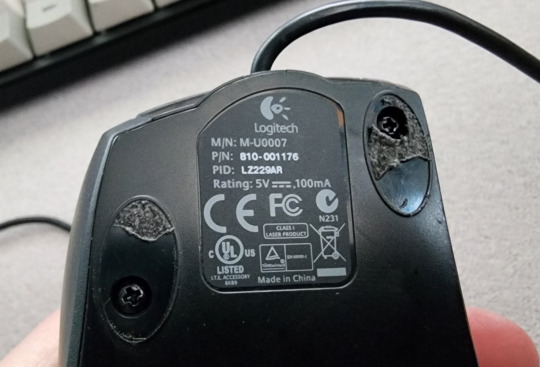
OH THERE THEY ARE. under the little skid-pads, which cannot be put back on once you take them off, because the adhesive has been ruined! You have to buy replacement pads, if they're available, and maybe cut them down to size, as well as clean off the residue of the previous pads.
You know how this problem could be fixed? JUST DON'T PUT THE PADS ON TOP OF THE SCREWS!
Then you'd have no problem. Easy to disassemble and clean.
But then it'd look 5% uglier because apparently people are scared of seeing screws, and also people might not just throw it out and buy a new one!
It's the terrible sort of weird planned obsolescence that happens as an almost accidental side effect of improving the product. Like, ball mice? They were designed to be disassembled. You didn't even need a screwdriver! Because you had to clean them regularly, or they'd gunk up too fast. Modern optical mice? They still get gunked up, the buttons and wheel still die eventually. They can be cleaned and repaired. But now that it's not required for all of them to be cleaned regularly, that function has been removed. they're designed to be disposable.
The same thing happened with TVs way back when. If you open up a TV from the 50s (or just look at the back, honestly, many of them were designed to be always-open), you'll find a schematic showing where all the tubes are and what models they are. Was this because the 1950s was a golden era of reparability? NO! it's because they burnt out all the time and you had to replace them! As soon as TVs got reliable enough that replacing tubes was no longer needed, the schematics became hidden behind paywalls and for authorized-service-personnel-only.
It would be only a minor change in aesthetics to make your mouse repairable/cleanable. Hell, most of the time when it's not simply fixed by cleaning it, it's because one of these broke:

This is an Omron D2FC-F-7N microswitch, used in a bunch of mice. It's designed to last about a million clicks. With a soldering iron and some solder (like 25$ on amazon) you can trivially replace it. New switches cost between like 10 cents and 2 dollars, depending where you buy it and how many you want. A couple bucks of parts and half an hour's worth of work, you can repair a 40$ mouse that's "died".
But they make it unnecessarily hard with the slide-pads being unreplacable. You have to find ones that match, you have to carefully clean off the old residue with IPA, or the new ones you just bought will fall off. All to make it look SLIGHTLY better (how often are you looking at the aesthetics of the bottom of your mouse, exactly? (no furries are allowed to answer this question!)) and maybe, just maybe, to push it over into "not worth it". You could do all that, but you have to buy new switches, new slide-pads/mouse-feet (SHUT UP FURRIES), and can you remember where your solder even is? you last used it when you were trying to fix that keyboard...
Basically one thing that is maddening to anyone with the very basics of electronic knowledge (seriously: the amount of skill you need for this is the kind you can get in less than an hour from watching a youtube tutorial) that we're surrounded by all this electrical nonsense that will break and have to be thrown out, but is mostly breaking in ways that could be fixed in a very short amount of time with relatively little work.
It's infuriating to go on amazon to buy another damn mouse and it pop up "hey you last bought this in 2021, you fool" and you're like I KNOW, IT SHOULD STILL BE WORKING TODAY!
I have computer parts from the 80s in my room right now that are still working when stuff made in the last 5 years is already dying! There's no reason it should be this way. It's an endless waste of time and money and resources and it's just to make some logitech or whoever executives slightly richer.
It's deeply bullshit. The modern day is going to be identifiable as the geological layer where most of the trash was generated. We're living in the middle of the quisquiliarumferous period: the layer of garbage.
#electronics#right to repair#planned obsolescence#ranting#I'm not actually mad at furries#it's a joke#I am a furry
3K notes
·
View notes
Text


Source
Let’s go!
#farmers#working class#solidarity#Colorado#politics#us politics#government#the left#progressive#capitalism#eat the rich#workers rights#right to repair
3K notes
·
View notes
Text
Right to Repair Therapy
For me, right to to repair isn't just about ewaste, and preventing corporate gouging.
It's about mental health. Being able to fix your gadgets is therapeutic. Empowering. Good for the soul.

Today I fixed my expensive bluetooth earbuds. Their batteries couldn't hold a charge for a full hour. (Turns out this was due to a botched firmware update and totally Sony's fault!)
This is the guide I used:
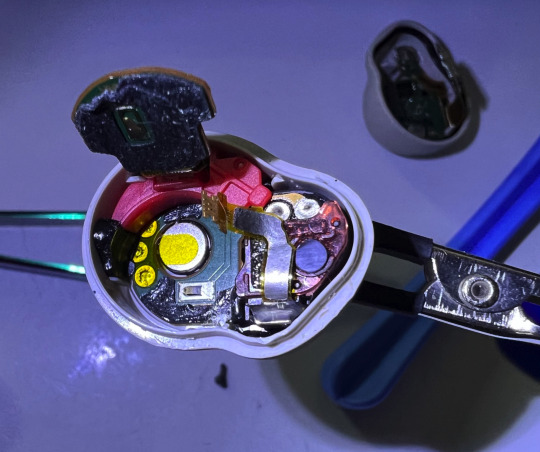
We tried a course of new firmware but the patients continued to deteriorate (as the specialist predicted.) Surgical intervention was unavoidable. The patients are currently convalescing in the charging dock. The procedure was smooth and they will only have minor scars, but a full recovery cannot be guaranteed until they reach full power and take one last course of software updates.

Surgery was successful. The seams won’t be the same ever. But it’s only noticeable if I look for it.
In a world full of complex technology it's easy to feel small and helpless. And maybe I'm too much of an idealist, but I think that if everyone could experience the joy of fixing or modifying a gadget now and then we'd all be a little more open minded, a little more daring. A little harder to push around.
#repairing#right to repair#repair therapy#electronics#gadgets#bluetooth#ear buds#sony#bad firmware#firmware update
473 notes
·
View notes
Text
Silicon valley tech bro: this new thing is so cool! It will revolutionize everything and-
Me: can I repair it?
Tech bro: umm no
Me: then it's shit and I don't want it
363 notes
·
View notes
Text
Who truly believes in the Right to Repair?
The Far Left thinks that ‘Right to Repair’ is a left-wing issue.
But it is completely incompatible with their desire to nationalize every industry and give the government totalitarian control over every aspect of private life.
“You will own nothing and you will be happy” is the complete antithesis of ‘Right to Repair’.
Relatedly, the push for a Central Bank Digital Currency is predicated on the government’s desire for a form of money that citizens are not permitted to own. Effectively denying “right to repair” down to the very level of currency.
A currency that cannot be spent on things disapproved by the government, and which must be spent rather than saved. All the better to keep the government’s favored industries artificially propped up, and to starve dissidents.
284 notes
·
View notes
Text
Heard this morning (27 March, 2023) A transcript for this piece is not yet up. They're usually up in a couple of days.
~3 minute listen.
This one right-to-repair law got through in just one state, because the lawmaker who introduced it narrowed its focus down from "The right of everybody to repair anything" (too many businesses to lobby against that) to "the right of wheelchair users to repair their own wheelchairs."
On the one hand it's great. On the other hand, it's a reminder of how marginalized we are in society.
Next thing to fight for: the right of farmers to repair their own farm equipment.
One state's gotten started. Forty-nine to go...
Transcript is now up. I've put the full thing under the cut.
MICHEL MARTIN, HOST:
Somewhere on your list of life's annoyances is probably this - manufacturers who won't let customers fix products themselves. Some states are pushing back with right-to-repair laws. Andrew Kenney from Colorado Public Radio visited with one of the first people to use a new right-to-repair law for powered wheelchairs.
(SOUNDBITE OF WHEELCHAIR WHIRRING)
ANDREW KENNEY, BYLINE: Bruce Goguen, who's 68, has used his powered wheelchair for so long that it feels like an extension of himself. He has multiple sclerosis, which affects his speech.
BRUCE GOGUEN: I just think of it as legs, as being my legs.
KENNEY: And that means when he got a new chair last year, every detail had to be right, like the speed of its different modes. His wife, Robin Bolduc, says each one of those adjustments required a visit from an authorized technician. It took weeks.
ROBIN BOLDUC: We would have to call someone, make an appointment, have them come out and say, gee, I'd like to change it so we're walking just a little bit faster.
KENNEY: On one of those visits, Robin realized that the technician wasn't using some specialized device to change the settings. It was a smartphone app. She even found it on the App Store, but it was only available for authorized users.
BOLDUC: Well, I want the app. And he was like, you can't have the app. But I want the app.
KENNEY: That would've been the end of the road, except that Robin and Bruce knew that Colorado's new wheelchair right-to-repair to repair law had just gone into effect. Representative Brianna Titone is the sponsor of the new law. Back in 2021, she originally proposed a much broader bill that would've applied to computers, cellphones and more. That meant an uphill fight against lobbyists for everything from hospitals to tech giants.
BRIANNA TITONE: So I did not win that fight. I lost that fight pretty bad. So that's why the following year, we pared it back to the people who really deserve to have this right. And that were the people who were in wheelchairs.
TITONE: The narrower, wheelchair-focused law passed the legislature last year with the help of advocates like Bruce and Robin. Once it went into effect on New Year's Day, Robin called the manufacturer to demand access to their app.
BOLDUC: They were not prepared. Right. Which - understandably, we're the only state. And it was day one, right? So they were not prepared.
KENNEY: In a committee hearing last year, Tonya Hammatt of National Seating and Mobility, a wheelchair vendor, warned state lawmakers that power wheelchairs are too complex for DIY jobs.
(SOUNDBITE OF ARCHIVED RECORDING)
TONYA HAMMATT: This bill will allow anyone to perform complex repairs to power wheelchairs, which may lead to negative outcomes for the end user.
KENNEY: But after Robin showed Bruce's wheelchair's maker the text of the law, they agreed, sending out two staffers to get the family set up with the internal software.
BOLDUC: They gave me the code to get into the app. We played around. We programmed.
KENNEY: The couple have been tweaking the wheelchair's different modes, searching for the perfect speed for Robin to jog alongside Bruce or the right settings for a steep walking trail.
GOGUEN: It's wonderful. It's very wonderful.
KENNEY: And their success could have broader effects. They've been told the manufacturer is working on a public-facing app for everyone else who wants to use it. The company didn't respond to a request for comment. Meanwhile, right-to-repair laws are gaining momentum around the country, says Kevin O'Reilly of the advocacy group PIRG.
KEVIN O'REILLY: We think that this first bill was the crack in the dam that we needed.
KENNEY: That includes a new bill from Representative Titone that guarantees similar rights for farmers to repair their increasingly high-tech tractors and other equipment. It's poised to clear the state legislature in a matter of weeks. For NPR News, I'm Andrew Kenney.
(SOUNDBITE OF EDAPOLLO'S "BY THE RIVER")
883 notes
·
View notes
Link
“Across America, more than 20 state legislatures are looking over proposed laws that would help guarantee citizens’ access to parts, instructions, and diagnoses to help them repair products—from smartphones to tractors—in their own homes.
Called the “Right to Repair” movement, it’s been growing in urgency and size since the turn of the millennium, and 2023 could be the first year in many where the DIY capability of the American consumer grew, rather than diminished.
In Colorado, a bill was passed along party lines in the State House 9-4, mandating that tractor and other farm equipment manufacturers provide enough parts and instructions to allow farmers to repair their own tractors.
“The manufacturers and the dealers have a monopoly on that repair market because it’s lucrative,” said Rep. Brianna Titone, a Democrat and one of the bill’s sponsors. “(Farmers) just want to get their machine going again.”
Certain dealers like John Deere (previously) and Steiger don’t allow, as part of the buying agreement, fixes at home, but as an article in the Miami Herald points out, repairmen aren’t on call 24-7 in the high plains of Colorado. One farmer had to wait 5 days for a service on his tractor that stopped during a crucial period in the growing season, where he could have been losing as much as $83,000 a day.
Right to Repair farming legislation is on the table or has already passed in 10 states in the Union, including Colorado, but also Florida, Maryland, Missouri, New Jersey, Texas, and Vermont...
It’s not just tractors that are potentially becoming easier to fix at home, but automobiles as well.
This January, the Right to Equitable and Professional Auto Industry Repair Act was introduced into the House.
“The legislation would require all tools and equipment, wireless transmission of repair and diagnostic data, and telematics systems needed for vehicle repairs to be made available to the independent repair industry,” writes Automotive News.
The bill has come to the House after similar legislation was passed in Massachusetts and Maine, where lawmakers wanted to beef up the right-to-repair and aftermarket auto parts industry, especially regarding telematic data and other information from onboard computers.
Just as it wasn’t only tractors and farmers who felt their right to DIY repairs needed protecting, it isn’t only mechanical engineering where right-to-repair is flourishing.
The New York state Senate signed the Digital Fair Repair Act into law in the dying days of December, ensuring original equipment manufacturers make parts, instructions, and diagnostics data available to anyone looking to repair a device, such as a smartphone or tablet.
“As technology and smart devices become increasingly essential to our daily lives, consumers should be able to easily fix the devices they rely on in a timely fashion,” Governor Kathy Hochul said. “This legislation will empower consumers with better options to repair their devices, thereby maximizing the lifespan of their devices, saving money, and reducing electronic waste.” ...
“After a decade of trying, we get two [state laws] in a very short period of time,” Kyle Wiens, CEO of iFixit, told Axios.
“Every single day, I’m seeing a couple more states file a new bill. And I think we’re going to be over 20 states very soon and those bills are moving.”
There’s also something to be said for the ultimate end which consumers of many of these irreparable items are forced to make for them; they end up in landfills. E-waste is a potentially-catastrophic oncoming environmental problem since it doesn’t really biodegrade in any meaningful sense, and recycling it requires technical dismantling.
The right-to-repair is also equally about keeping easily-fixable devices out of the landfills.”
-via Good News Network, 2/14/23
#right to repair#diy#monopoly#big tech#tech industry#auto industry#tractor#farmers#agriculture#us politics#united states#colorado#maine#michigan#new york#good news#hope
810 notes
·
View notes
Text
Your car spies on you and rats you out to insurance companies

I'm on tour with my new, nationally bestselling novel The Bezzle! Catch me TOMORROW (Mar 13) in SAN FRANCISCO with ROBIN SLOAN, then Toronto, NYC, Anaheim, and more!

Another characteristically brilliant Kashmir Hill story for The New York Times reveals another characteristically terrible fact about modern life: your car secretly records fine-grained telemetry about your driving and sells it to data-brokers, who sell it to insurers, who use it as a pretext to gouge you on premiums:
https://www.nytimes.com/2024/03/11/technology/carmakers-driver-tracking-insurance.html
Almost every car manufacturer does this: Hyundai, Nissan, Ford, Chrysler, etc etc:
https://www.repairerdrivennews.com/2020/09/09/ford-state-farm-ford-metromile-honda-verisk-among-insurer-oem-telematics-connections/
This is true whether you own or lease the car, and it's separate from the "black box" your insurer might have offered to you in exchange for a discount on your premiums. In other words, even if you say no to the insurer's carrot – a surveillance-based discount – they've got a stick in reserve: buying your nonconsensually harvested data on the open market.
I've always hated that saying, "If you're not paying for the product, you're the product," the reason being that it posits decent treatment as a customer reward program, like the little ramekin warm nuts first class passengers get before takeoff. Companies don't treat you well when you pay them. Companies treat you well when they fear the consequences of treating you badly.
Take Apple. The company offers Ios users a one-tap opt-out from commercial surveillance, and more than 96% of users opted out. Presumably, the other 4% were either confused or on Facebook's payroll. Apple – and its army of cultists – insist that this proves that our world's woes can be traced to cheapskate "consumers" who expected to get something for nothing by using advertising-supported products.
But here's the kicker: right after Apple blocked all its rivals from spying on its customers, it began secretly spying on those customers! Apple has a rival surveillance ad network, and even if you opt out of commercial surveillance on your Iphone, Apple still secretly spies on you and uses the data to target you for ads:
https://pluralistic.net/2022/11/14/luxury-surveillance/#liar-liar
Even if you're paying for the product, you're still the product – provided the company can get away with treating you as the product. Apple can absolutely get away with treating you as the product, because it lacks the historical constraints that prevented Apple – and other companies – from treating you as the product.
As I described in my McLuhan lecture on enshittification, tech firms can be constrained by four forces:
I. Competition
II. Regulation
III. Self-help
IV. Labor
https://pluralistic.net/2024/01/30/go-nuts-meine-kerle/#ich-bin-ein-bratapfel
When companies have real competitors – when a sector is composed of dozens or hundreds of roughly evenly matched firms – they have to worry that a maltreated customer might move to a rival. 40 years of antitrust neglect means that corporations were able to buy their way to dominance with predatory mergers and pricing, producing today's inbred, Habsburg capitalism. Apple and Google are a mobile duopoly, Google is a search monopoly, etc. It's not just tech! Every sector looks like this:
https://www.openmarketsinstitute.org/learn/monopoly-by-the-numbers
Eliminating competition doesn't just deprive customers of alternatives, it also empowers corporations. Liberated from "wasteful competition," companies in concentrated industries can extract massive profits. Think of how both Apple and Google have "competitively" arrived at the same 30% app tax on app sales and transactions, a rate that's more than 1,000% higher than the transaction fees extracted by the (bloated, price-gouging) credit-card sector:
https://pluralistic.net/2023/06/07/curatorial-vig/#app-tax
But cartels' power goes beyond the size of their warchest. The real source of a cartel's power is the ease with which a small number of companies can arrive at – and stick to – a common lobbying position. That's where "regulatory capture" comes in: the mobile duopoly has an easier time of capturing its regulators because two companies have an easy time agreeing on how to spend their app-tax billions:
https://pluralistic.net/2022/06/05/regulatory-capture/
Apple – and Google, and Facebook, and your car company – can violate your privacy because they aren't constrained regulation, just as Uber can violate its drivers' labor rights and Amazon can violate your consumer rights. The tech cartels have captured their regulators and convinced them that the law doesn't apply if it's being broken via an app:
https://pluralistic.net/2023/04/18/cursed-are-the-sausagemakers/#how-the-parties-get-to-yes
In other words, Apple can spy on you because it's allowed to spy on you. America's last consumer privacy law was passed in 1988, and it bans video-store clerks from leaking your VHS rental history. Congress has taken no action on consumer privacy since the Reagan years:
https://www.eff.org/tags/video-privacy-protection-act
But tech has some special enshittification-resistant characteristics. The most important of these is interoperability: the fact that computers are universal digital machines that can run any program. HP can design a printer that rejects third-party ink and charge $10,000/gallon for its own colored water, but someone else can write a program that lets you jailbreak your printer so that it accepts any ink cartridge:
https://www.eff.org/deeplinks/2020/11/ink-stained-wretches-battle-soul-digital-freedom-taking-place-inside-your-printer
Tech companies that contemplated enshittifying their products always had to watch over their shoulders for a rival that might offer a disenshittification tool and use that as a wedge between the company and its customers. If you make your website's ads 20% more obnoxious in anticipation of a 2% increase in gross margins, you have to consider the possibility that 40% of your users will google "how do I block ads?" Because the revenue from a user who blocks ads doesn't stay at 100% of the current levels – it drops to zero, forever (no user ever googles "how do I stop blocking ads?").
The majority of web users are running an ad-blocker:
https://doc.searls.com/2023/11/11/how-is-the-worlds-biggest-boycott-doing/
Web operators made them an offer ("free website in exchange for unlimited surveillance and unfettered intrusions") and they made a counteroffer ("how about 'nah'?"):
https://www.eff.org/deeplinks/2019/07/adblocking-how-about-nah
Here's the thing: reverse-engineering an app – or any other IP-encumbered technology – is a legal minefield. Just decompiling an app exposes you to felony prosecution: a five year sentence and a $500k fine for violating Section 1201 of the DMCA. But it's not just the DMCA – modern products are surrounded with high-tech tripwires that allow companies to invoke IP law to prevent competitors from augmenting, recongifuring or adapting their products. When a business says it has "IP," it means that it has arranged its legal affairs to allow it to invoke the power of the state to control its customers, critics and competitors:
https://locusmag.com/2020/09/cory-doctorow-ip/
An "app" is just a web-page skinned in enough IP to make it a crime to add an ad-blocker to it. This is what Jay Freeman calls "felony contempt of business model" and it's everywhere. When companies don't have to worry about users deploying self-help measures to disenshittify their products, they are freed from the constraint that prevents them indulging the impulse to shift value from their customers to themselves.
Apple owes its existence to interoperability – its ability to clone Microsoft Office's file formats for Pages, Numbers and Keynote, which saved the company in the early 2000s – and ever since, it has devoted its existence to making sure no one ever does to Apple what Apple did to Microsoft:
https://www.eff.org/deeplinks/2019/06/adversarial-interoperability-reviving-elegant-weapon-more-civilized-age-slay
Regulatory capture cuts both ways: it's not just about powerful corporations being free to flout the law, it's also about their ability to enlist the law to punish competitors that might constrain their plans for exploiting their workers, customers, suppliers or other stakeholders.
The final historical constraint on tech companies was their own workers. Tech has very low union-density, but that's in part because individual tech workers enjoyed so much bargaining power due to their scarcity. This is why their bosses pampered them with whimsical campuses filled with gourmet cafeterias, fancy gyms and free massages: it allowed tech companies to convince tech workers to work like government mules by flattering them that they were partners on a mission to bring the world to its digital future:
https://pluralistic.net/2023/09/10/the-proletarianization-of-tech-workers/
For tech bosses, this gambit worked well, but failed badly. On the one hand, they were able to get otherwise powerful workers to consent to being "extremely hardcore" by invoking Fobazi Ettarh's spirit of "vocational awe":
https://www.inthelibrarywiththeleadpipe.org/2018/vocational-awe/
On the other hand, when you motivate your workers by appealing to their sense of mission, the downside is that they feel a sense of mission. That means that when you demand that a tech worker enshittifies something they missed their mother's funeral to deliver, they will experience a profound sense of moral injury and refuse, and that worker's bargaining power means that they can make it stick.
Or at least, it did. In this era of mass tech layoffs, when Google can fire 12,000 workers after a $80b stock buyback that would have paid their wages for the next 27 years, tech workers are learning that the answer to "I won't do this and you can't make me" is "don't let the door hit you in the ass on the way out" (AKA "sharpen your blades boys"):
https://techcrunch.com/2022/09/29/elon-musk-texts-discovery-twitter/
With competition, regulation, self-help and labor cleared away, tech firms – and firms that have wrapped their products around the pluripotently malleable core of digital tech, including automotive makers – are no longer constrained from enshittifying their products.
And that's why your car manufacturer has chosen to spy on you and sell your private information to data-brokers and anyone else who wants it. Not because you didn't pay for the product, so you're the product. It's because they can get away with it.
Cars are enshittified. The dozens of chips that auto makers have shoveled into their car design are only incidentally related to delivering a better product. The primary use for those chips is autoenshittification – access to legal strictures ("IP") that allows them to block modifications and repairs that would interfere with the unfettered abuse of their own customers:
https://pluralistic.net/2023/07/24/rent-to-pwn/#kitt-is-a-demon
The fact that it's a felony to reverse-engineer and modify a car's software opens the floodgates to all kinds of shitty scams. Remember when Bay Staters were voting on a ballot measure to impose right-to-repair obligations on automakers in Massachusetts? The only reason they needed to have the law intervene to make right-to-repair viable is that Big Car has figured out that if it encrypts its diagnostic messages, it can felonize third-party diagnosis of a car, because decrypting the messages violates the DMCA:
https://www.eff.org/deeplinks/2013/11/drm-cars-will-drive-consumers-crazy
Big Car figured out that VIN locking – DRM for engine components and subassemblies – can felonize the production and the installation of third-party spare parts:
https://pluralistic.net/2022/05/08/about-those-kill-switched-ukrainian-tractors/
The fact that you can't legally modify your car means that automakers can go back to their pre-2008 ways, when they transformed themselves into unregulated banks that incidentally manufactured the cars they sold subprime loans for. Subprime auto loans – over $1t worth! – absolutely relies on the fact that borrowers' cars can be remotely controlled by lenders. Miss a payment and your car's stereo turns itself on and blares threatening messages at top volume, which you can't turn off. Break the lease agreement that says you won't drive your car over the county line and it will immobilize itself. Try to change any of this software and you'll commit a felony under Section 1201 of the DMCA:
https://pluralistic.net/2021/04/02/innovation-unlocks-markets/#digital-arm-breakers
Tesla, naturally, has the most advanced anti-features. Long before BMW tried to rent you your seat-heater and Mercedes tried to sell you a monthly subscription to your accelerator pedal, Teslas were demon-haunted nightmare cars. Miss a Tesla payment and the car will immobilize itself and lock you out until the repo man arrives, then it will blare its horn and back itself out of its parking spot. If you "buy" the right to fully charge your car's battery or use the features it came with, you don't own them – they're repossessed when your car changes hands, meaning you get less money on the used market because your car's next owner has to buy these features all over again:
https://pluralistic.net/2023/07/28/edison-not-tesla/#demon-haunted-world
And all this DRM allows your car maker to install spyware that you're not allowed to remove. They really tipped their hand on this when the R2R ballot measure was steaming towards an 80% victory, with wall-to-wall scare ads that revealed that your car collects so much information about you that allowing third parties to access it could lead to your murder (no, really!):
https://pluralistic.net/2020/09/03/rip-david-graeber/#rolling-surveillance-platforms
That's why your car spies on you. Because it can. Because the company that made it lacks constraint, be it market-based, legal, technological or its own workforce's ethics.
One common critique of my enshittification hypothesis is that this is "kind of sensible and normal" because "there’s something off in the consumer mindset that we’ve come to believe that the internet should provide us with amazing products, which bring us joy and happiness and we spend hours of the day on, and should ask nothing back in return":
https://freakonomics.com/podcast/how-to-have-great-conversations/
What this criticism misses is that this isn't the companies bargaining to shift some value from us to them. Enshittification happens when a company can seize all that value, without having to bargain, exploiting law and technology and market power over buyers and sellers to unilaterally alter the way the products and services we rely on work.
A company that doesn't have to fear competitors, regulators, jailbreaking or workers' refusal to enshittify its products doesn't have to bargain, it can take. It's the first lesson they teach you in the Darth Vader MBA: "I am altering the deal. Pray I don't alter it any further":
https://pluralistic.net/2023/10/26/hit-with-a-brick/#graceful-failure
Your car spying on you isn't down to your belief that your carmaker "should provide you with amazing products, which brings your joy and happiness you spend hours of the day on, and should ask nothing back in return." It's not because you didn't pay for the product, so now you're the product. It's because they can get away with it.
The consequences of this spying go much further than mere insurance premium hikes, too. Car telemetry sits at the top of the funnel that the unbelievably sleazy data broker industry uses to collect and sell our data. These are the same companies that sell the fact that you visited an abortion clinic to marketers, bounty hunters, advertisers, or vengeful family members pretending to be one of those:
https://pluralistic.net/2022/05/07/safegraph-spies-and-lies/#theres-no-i-in-uterus
Decades of pro-monopoly policy led to widespread regulatory capture. Corporate cartels use the monopoly profits they extract from us to pay for regulatory inaction, allowing them to extract more profits.
But when it comes to privacy, that period of unchecked corporate power might be coming to an end. The lack of privacy regulation is at the root of so many problems that a pro-privacy movement has an unstoppable constituency working in its favor.
At EFF, we call this "privacy first." Whether you're worried about grifters targeting vulnerable people with conspiracy theories, or teens being targeted with media that harms their mental health, or Americans being spied on by foreign governments, or cops using commercial surveillance data to round up protesters, or your car selling your data to insurance companies, passing that long-overdue privacy legislation would turn off the taps for the data powering all these harms:
https://www.eff.org/wp/privacy-first-better-way-address-online-harms
Traditional economics fails because it thinks about markets without thinking about power. Monopolies lead to more than market power: they produce regulatory capture, power over workers, and state capture, which felonizes competition through IP law. The story that our problems stem from the fact that we just don't spend enough money, or buy the wrong products, only makes sense if you willfully ignore the power that corporations exert over our lives. It's nice to think that you can shop your way out of a monopoly, because that's a lot easier than voting your way out of a monopoly, but no matter how many times you vote with your wallet, the cartels that control the market will always win:
https://pluralistic.net/2024/03/05/the-map-is-not-the-territory/#apor-locksmith

Name your price for 18 of my DRM-free ebooks and support the Electronic Frontier Foundation with the Humble Cory Doctorow Bundle.

If you'd like an essay-formatted version of this post to read or share, here's a link to it on pluralistic.net, my surveillance-free, ad-free, tracker-free blog:
https://pluralistic.net/2024/03/12/market-failure/#car-wars

Image:
Cryteria (modified)
https://commons.wikimedia.org/wiki/File:HAL9000.svg
CC BY 3.0
https://creativecommons.org/licenses/by/3.0/deed.en
#pluralistic#if you're not paying for the product you're the product#if you're paying for the product you're the product#cars#automotive#enshittification#technofeudalism#autoenshittification#antifeatures#felony contempt of business model#twiddling#right to repair#privacywashing#apple#lexisnexis#insuretech#surveillance#commercial surveillance#privacy first#data brokers#subprime#kash hill#kashmir hill
2K notes
·
View notes
Photo
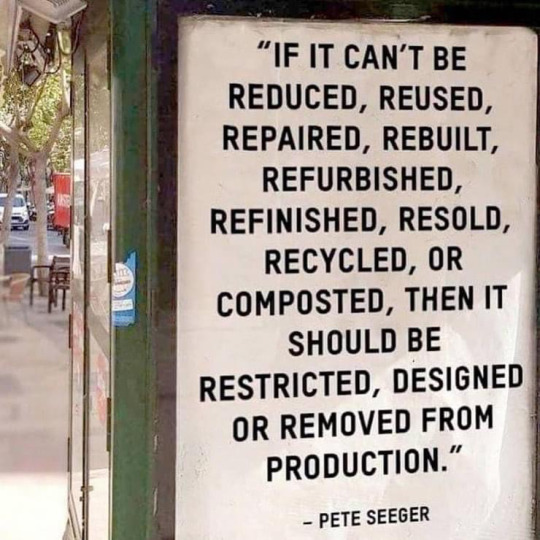
“If it can’t be reduced, reused, repaired, rebuilt, refurbished, refinished, resold, recycled or composted, then it should be restricted, redesigned or removed from production.”
― Pete Seeger
youtube
#Pete Seeger#recycling#folk music#famous quotes#quotes#quote#compost#reduce#reduce reuse recycle#recylcing#solarpunk#solar punk#right to repair
608 notes
·
View notes
Text

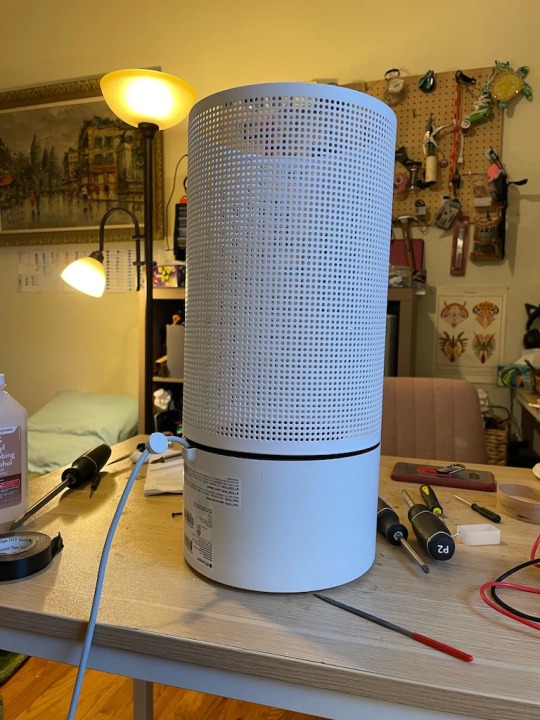
Kimchi (left) may or may not have thrown up on @fishteriously's air purifier (right) and killed it. Either way, it was dead and out of warranty, so we grabbed a multimeter and pried it open.
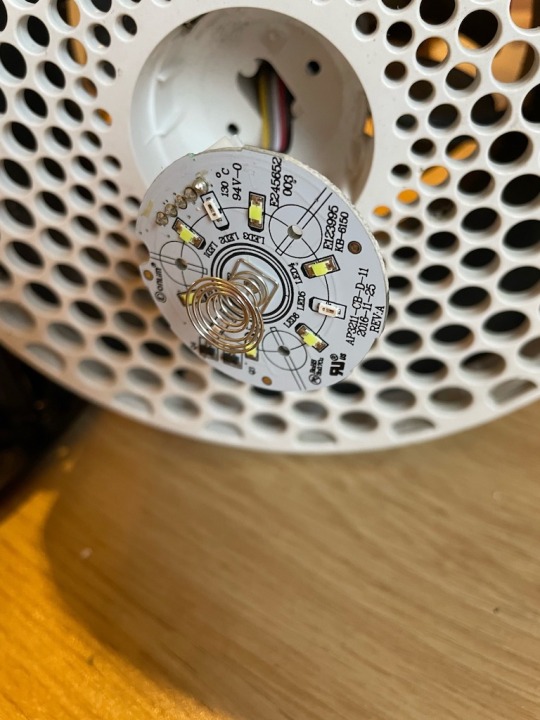
Ok so, the 12V power supply was working, regulated 5V power was getting where it was supposed to go, all the cables were secure and I couldn't find any shorts, but the thing was still dead. Also there was a mysterious brown goo all over it (mostly wiped off in this image).
Now, I'm a mechanical engineer, not an electrical engineer. But from what I understand, this state – where the power is good, but nothing is happening and there's something gross on it – is known as "turbo fucked."
But like, okay, once you get rid of all the bells and whistles such as "a user interface" and "selectable speed" and "digital electronics," an air purifier is just a fan, a cowl, and a filter, right? All analog components. There are plenty of places here to tap 5V power, so if I disconnect the microprocessor entirely, grab a jumper wire, and short 5V directly into the PWM input...

lol. lmao. It spins.

There we go! All put back together and working like a charm. I mean, the LED's and computer aren't connected to anything, but the fan is going and it purifies the air just fine.
I didn't like the look of the dead pcb sticking out of the top. But the wire cutters were on the other side of the room, and I hurt my fingernail last time I futzed with the ribbon cable...

Perfect. Good as new.
98 notes
·
View notes
Text
#nice #right to repair movement #though I think right to repair should be limited to some extent #I don't want unqualified people trying to fix essential life-or-death things like brakes #or engines
Tags from some video it's not important, but they make me want to talk about right to repair, what it is, and what it ain't.
Right to repair is a specific framing of a more general personal and/or private property right that grants you the ability to alter or have altered on your behalf any object in your possession. Whether you want to upgrade, fix, break, downgrade, or laterally customize the object, the right to repair bestows on you that capability, and the additional unspoken right to choose any qualified person you want to make the desired alterations on your behalf if you yourself are not qualified.
The reason it's such a big deal is because companies don't want you to be able to do this. Apple, Toyota, Ford, John Deer, and so on all want you to be entirely reliant on them as the sole source of repairability and modification so they can take as large a slice of the pie out of that secondary market as they have in the primary market; because if they can charge you for repairs, or refuse to repair it at all (inventing the need for a full cost replacement) that's more profit in the shareholders' pockets.
Having the right to repair does mean having the ability to open up your car and ruin the engine; but everyone who isn't my father would never do that because cars are the most expensive consumer good normal people will ever own, and the tendency among normal people is toward preserve the car's value as a functional object.
Instead they'd take the car to an expert of their choice to be repaired on their behalf, and again Ford etc would rather you be required take it to a liscenced Ford repair person paying Ford repair liscence premiums, even for something as routine as a tire rotation or oil change, because then Ford gets a kickback which is more money than they'd get if you tooke it to the equally, or perhaps more, qualified Moe's Auto Repair that doesn't bother with Ford liscenced repair shop nonsense.
And if someone vastly unqualified to throw a wrench into their car engine does so, and shreks their car's roadworthiness, there are laws defining road worthiness and the privilege of driving which regulate to mitigate the potential damage that behavior can cause without infringing upon the right to repair. Not to mention cars without working engines don't run; just ask my father who somehow managed to completely brick his Ford F150.
...
The right to repair movement isn't telling everyone to repair everything they own themselves, or at least that's not what anyone correctly articulating the point of the right to repair movement is saying, but rather trying to free everyone from the oppressive policies of manufacturers who want a monopolistically large cut of the repairs market, and are using paternalism to justify their unfair business praxises.
317 notes
·
View notes